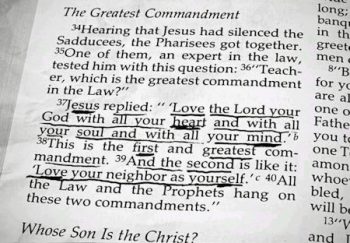After the enslaved Israelites were delivered out of Egypt, ten major commands were given by God to Moses upon Mount Sinai. This was part of the contract or covenant between God and his people and it introduced fundamental rules for worship and social ethics.
These rules were written upon two tablets of stone called the Decalogue,1 but best known as the ‘Ten Commandments’. These commandments are listed in the Bible in two places, which exhibits some variation (Exodus 20:2–17 and Deuteronomy 5:6–21).
And there is some confusion about these commandments, as to if they are even of any further value in this Christian period of grace, because of statements made by Jesus and his apostles. Jesus said he came to fulfill the law (Matthew 5:17), which actually demonstrated the logic of following not the letter of the law, but its spirit or meaning (see Mark 2:24; 7:19). And his disciples rejected many of the Old Testament laws (see Acts 15; Galatians 5:6; 6:15). The Apostle Paul once stated, “For sin will have no dominion over you, since you are not under law but under grace” (Romans 6:14), as well as “For to this day, when they read the old covenant, that same veil remains unlifted, because only through Christ is it taken away” (2 Corinthians 3:14).2
Although these verses seem to suggest the law was muted, they are all taken out of context. For instance, when Jesus stated he was here to fulfill the law, he really meant it would be completely fulfilled after he died and returned. He was preparing his followers for how the world will be, not as it was. But, even so, fulfilled does not mean abolished.
 Besides, Jesus also said, “I say to you, until heaven and earth pass away, not an iota, not a dot, will pass from the Law until all is accomplished. Therefore whoever relaxes one of the least of these commandments and teaches others to do the same will be called least in the kingdom of heaven, but whoever does them and teaches them will be called great in the kingdom of heaven. For I tell you, unless your righteousness exceeds that of the scribes and Pharisees, you will never enter the kingdom of heaven.” (Matthew 5:18-20).
Besides, Jesus also said, “I say to you, until heaven and earth pass away, not an iota, not a dot, will pass from the Law until all is accomplished. Therefore whoever relaxes one of the least of these commandments and teaches others to do the same will be called least in the kingdom of heaven, but whoever does them and teaches them will be called great in the kingdom of heaven. For I tell you, unless your righteousness exceeds that of the scribes and Pharisees, you will never enter the kingdom of heaven.” (Matthew 5:18-20).
Jesus called for an inward change of thought and action toward God and humankind. He gave the Jews an opportunity to repent and return to God during his life on earth, but neither the religious leaders, nor most people would oblige. He discussed and debated with the leaders in the Temple, but they were deaf and blind to the truth. They had a choice to make, but their choice was wrong and that would bring condemnation.3 Historically, God’s people repeatedly made wrong decisions; only relatively few would see the light.
When once asked which commandment was the most important, Jesus replied, “You shall love the Lord your God with all your heart and with all your soul and with all your mind. This is the great and first commandment. And a second is like it: You shall love your neighbor as yourself. On these two commandments depend all the Law and the Prophets.” (Matthew 22:37-40). All ten commandments in the Hebrew Bible are summed up into these two important principles.
When first given, God divided his commandments into two categories, those pertaining to our relationship with God (numbers 1-4) and those which pertain to our relationship to our fellow humans (numbers 5-10). Jesus said that all the laws hinge upon these two guiding principles: love God and love your neighbor.4 If you do these two things, all else will fall into place. The song selected for this article concerns these two laws and is described in the last paragraphs of this article.
The Second Commandment
That background was necessary for our study of the 2nd commandment of the Decalogue. Although most lists of ‘The Ten Commandments’ abbreviate the second one to “You shall make no idols,” there is a lot more to it, as the following scripture states.
“You shall not make for yourself a carved image, or any likeness of anything that is in heaven above, or that is in the earth beneath, or that is in the water under the earth. You shall not bow down to them or serve them, for I the LORD your God am a jealous God, visiting the iniquity of the fathers on the children to the third and the fourth generation of those who hate me, but showing steadfast love to thousands of those who love me and keep my commandments.” (Exodus 20:4-6).
 Before further consideration, it is important to make this note. Catholicism deletes the 2nd commandment (“You shall not make for yourself a carved image5 or any likeness…”). A common belief is that the Catholic Church changed the listing of the Ten Commandments by removing this commandment about “not worshiping idols” and divided the 10th commandment into two parts,6 so there would still be a total of ten.
Before further consideration, it is important to make this note. Catholicism deletes the 2nd commandment (“You shall not make for yourself a carved image5 or any likeness…”). A common belief is that the Catholic Church changed the listing of the Ten Commandments by removing this commandment about “not worshiping idols” and divided the 10th commandment into two parts,6 so there would still be a total of ten.
The Catholic Church, however, gives a different reason for the change. They justify the change by claiming the original texts did not have verse numbers and did not specify how they should be grouped. According to one Catholic writer, it was St. Augustine’s reasoning to divide the Decalogue this way and the church just continues to observe it.7 It should also be noted that the Lutheran Churches (but not the Reformed) and some few others, follow this same tradition.
Now, going back to God’s second commandment, as accurately stated in the Bible book of Exodus — why should we not have a man-made image? Wouldn’t a visible idol or representative image be helpful as a constant reminder of God Almighty? Wouldn’t an image of some type be helpful in teaching? Other Near Eastern cultures had crafted idols to represent the Pagan gods they loved, so why not do the same? Good questions, however there is, also, a good answer of why they are not allowed.
 Old Testament Studies expert, Dr. Dorian Coover-Cox,8 explains this quite well. She said, “God is concerned to protect the integrity of his relationship with his people (Exodus 34:14). If the Israelites made idols to worship, it would be an act of hatred, disloyalty, and repudiation. When the Lord made himself known to the Israelites, they did not see any form (Deuteronomy 4:10–20). The best way to know and worship him was to recall what he had already done and said, and to be alert to trust him and see what he would do in the future.”9
Old Testament Studies expert, Dr. Dorian Coover-Cox,8 explains this quite well. She said, “God is concerned to protect the integrity of his relationship with his people (Exodus 34:14). If the Israelites made idols to worship, it would be an act of hatred, disloyalty, and repudiation. When the Lord made himself known to the Israelites, they did not see any form (Deuteronomy 4:10–20). The best way to know and worship him was to recall what he had already done and said, and to be alert to trust him and see what he would do in the future.”9
Basically, God was invisible from the very start and any representative image could not be possible, for they did not know what he looked like. This is very explicit in both the Hebrew Bible as well as the Christian New Testament. “You cannot see my face, for man shall not see me and live.” (Exodus 33:20) and “No one has ever seen God; if we love one another, God abides in us and his love is perfected in us.” (1 John 4:12). We must accept God by faith. Knowing God is a spiritual experience, not one of a physical nature.
Why do we suffer for the sins of our parents?
The second part of the 2nd commandment implies that we will suffer for the sins of our parents. Is that true? Well, this is one of those ‘yes’ and ‘no’ answers; it can mean that, but it doesn’t have to. It is not an intentional curse from God, but it is one that needs further explanation.
As commentator John Hannah said, those who sin are also affecting their future generations. If those traits are passed along to their children, then God will punish them also. But by contrast, those who love God, but refuse to be influenced by their flawed genetics or habitual patterns, will be rewarded for their obedience.10
 The ability of humans to pass their sins to their children has been proven by a new science called epigenetics. In other words, epigenetic activity makes physical changes to genes which can change how DNA11 expresses itself; these can be passed along to a new generation. For a deeper study of this biological science, see the article titled “The Science of Sin — is Evil Inherited?” listed in the References & Notes at the end of this article.12
The ability of humans to pass their sins to their children has been proven by a new science called epigenetics. In other words, epigenetic activity makes physical changes to genes which can change how DNA11 expresses itself; these can be passed along to a new generation. For a deeper study of this biological science, see the article titled “The Science of Sin — is Evil Inherited?” listed in the References & Notes at the end of this article.12
“This verse seems to say that God punishes children for the sins of their parents, which is not the case. God does not condemn children because of their parents’ misbehavior (see Deuteronomy 24:16; Ezekiel 18:20). However, children can suffer the consequences of their parents’ sinful choices.”13 This scripture does not suggest, however, that future children will be held morally accountable for the sins of ancestors but refers to the mutual consequences of sins.14
If a parent has had some dysfunctional behavior, such as drug or alcohol abuse, adultery, pornography addiction, and etc., this can be passed along by establishing a model pattern in children15 as well as through heredity. This can also trickle down to their own children, and even their grandchildren, thus affecting four generations.
I know that this study is specifically targeted to idol worship, but doesn’t the world worship all kinds of idols, other than religious ones? Here are a few that come to mind: money and other forms of materialism, sports and celebrity figures, entertainers, science, and even ego, pride and sex. People push God away, or delete him all together, to make room for their personal idols of worship — their substitutes for God.
All this makes sense of what the Apostle Paul said, “Therefore, just as sin came into the world through one man, and death through sin, and so death spread to all men because all sinned. Therefore, as one trespass led to condemnation for all men, so one act of righteousness leads to justification and life for all men.” (Romans 5:12, 18).
But our faith and spiritual relationship with God can change this situation. The good news is that even if epigenetic sinful modifications can be passed on to our offspring, they are reversible. In other words, it is possible to break the curse. “You can go either way. We can pass along both positive things in our life and/or negative, depending on the choices we make in life.”16
 Just as we can treat physical defects with physical medicines, why not also spiritual defects, like sin, with spiritual medication? “No temptation has overtaken you that is not common to man. God is faithful, and he will not let you be tempted beyond your ability, but with the temptation he will also provide the way of escape, that you may be able to endure it.” (1 Corinthians 10:13). We have control over our sins, because we have free will and God has given us final power over them. It may not be easy, but we can make our current life a righteous one and insure that we pass this characteristic to our children.17
Just as we can treat physical defects with physical medicines, why not also spiritual defects, like sin, with spiritual medication? “No temptation has overtaken you that is not common to man. God is faithful, and he will not let you be tempted beyond your ability, but with the temptation he will also provide the way of escape, that you may be able to endure it.” (1 Corinthians 10:13). We have control over our sins, because we have free will and God has given us final power over them. It may not be easy, but we can make our current life a righteous one and insure that we pass this characteristic to our children.17
As biblical scholar Robert Bergen poetically wrote, “Like ripples spreading across a pool of calm water, our actions have consequences for generations to come. We can create waves of difficulty or blessing according to the choices we make.”
So, don’t think the Bible is saying that actually punishing the children for their parent’s iniquity is mandated, because it is not. “This did not mean that in a court case a son would have to suffer the penalty for his father’s crime (Deuteronomy 24:16), nor that individual standing or fellowship with God was determined by the behavior of one’s parents (Jeremiah 31:29–30; Ezekiel 18:1–32). It meant that the excuse, ‘They don’t know any better; it’s how they were raised’, does not work with God. But the Lord’s faithful love would far exceed his judgment (to a thousand generations; Leviticus 26:39–45; Isaiah 65:6–7; Jeremiah 11:9–12; 32:17–19; Daniel 9:8–16).”18
And, to Wrap It all Up
The song selection, as mentioned earlier in this article, is about what Jesus said in Mark 12:29-31, concerning the two most important commandments (also see: Matthew 22:37-40). “The most important is . . . ‘And you shall love the Lord your God with all your heart and with all your soul and with all your mind and with all your strength.’ The second is this: ‘You shall love your neighbor as yourself.’ There is no other commandment greater than these.”
This uplifting Gospel song is titled “Loving God, Loving Each Other” and selected lyrics are below. View this music video, which is listed in References & Notes.19
 They pushed back from the table to listen to His words
They pushed back from the table to listen to His words
His secret plans before He had to go
It’s not complicated; don’t need a lot of rules
This is all you need to know
It’s loving God, loving each other
making music with my friends
Loving God, loving each other
and the story never ends
![]()
Copyright © 2020, Dr. Ray Hermann
OutlawBibleStudent.org
→ Leave comments at the end, after ‘References & Notes’.
You can see our basic rules for comments by clicking “The Fine Print” on the top menu bar.
Reference & Notes
- Decalogue: Greek: deca + logos (ten words).
- Unless otherwise indicated, all scripture quotations are taken from The Holy Bible, English Standard Version (ESV), ©2001 by Crossway, a publishing ministry of Good News Publishers. The text has been used by permission. All rights reserved.
- Hermann, Ray, “Christ’s Return Prophecies — the Signs of the End of this Age in Matthew 24″, (The Outlaw Bible Student, OBS, 20 May 2020), https://outlawbiblestudent.org/christs-return-prophecies-the-signs-of-the-end-of-this-age-in-matthew-24/
- Hoffmeier, James K., “Exodus,” in Evangelical Commentary on the Bible, Baker Reference Library, (Grand Rapids, MI: Baker Book House, 1995), vol. 3, p. 54.
- carved image: Strong’s Hebrew #6459, פֶּסֶל peçel, an idol:— carved (graven) image [manmade].
Strong, James, The New Strong’s Dictionary of Hebrew and Greek Words, (Nashville, TN: Thomas Nelson Publishers, 1996). - “Catholic Bible 101″, (Catholicbible101, retrieved 16 June 2020), https://catholicbible101.com/thetencommandments.htm
- Richardson, Joseph T., “St. Augustine on How to Divide the Ten Commandments: Did Catholics ‘Change’ the Ten Commandments?” (The Lonely Pilgrim, 9 October 2013), http://lonelypilgrim.com/2013/10/09/st-augustine-on-how-to-divide-the-ten-commandments-did-catholics-change-the-ten-commandments/
- Dr. Dorian G. Coover-Cox, Professor of Old Testament Studies, Dallas Theological Seminary.
“Dorian G. Coover-Cox”, (Dallas Theological Seminary, DTS, retrieved 14 June 2020), https://www.dts.edu/people/dcoover-cox/ - Coover-Cox, Dorian G., “Exodus,” in CSB Study Bible: Notes, (Eds.) Edwin A. Blum and Trevin Wax, (Nashville, TN: Holman Bible Publishers, 2017), p. 121.
- Hannah, John D., “Exodus,” in The Bible Knowledge Commentary: An Exposition of the Scriptures, (Eds.) J. F. Walvoord and R. B. Zuck, (Wheaton, IL: Victor Books, 1985), vol. 1, p. 139.
- DNA: deoxyribonucleic acid is a molecule carrying genetic instructions for the development, functioning, growth and reproduction of all known organisms.
“DNA”, (Wikipedia, Wikipedia Foundation Inc., 16 May 2020), https://en.wikipedia.org/wiki/DNA - Hermann, Ray, “The Science of Sin — is Evil Inherited?”, (The Outlaw Bible Student, OBS, 8 June 2020), https://outlawbiblestudent.org/the-science-of-sin-is-evil-inherited/
- Bergen, Robert D., “Exodus,” in CSB Apologetics Study Bible, (Ed.) Ted Cabal, (Nashville, TN: Holman Bible Publishers, 2017), p. 96.
- Barry, John D., et al., Faithlife Study Bible, (Bellingham, WA: Lexham Press, 2012, 2016), Exodus 20:5.
- Ibid.
- “Science Confirms Bible on Generational Curses?” (Conquer Series, retrieved 4 June 2020), https://conquerseries.com/science-confirms-bible-on-generational-curses/
- Bergen, Robert D., “Exodus,” (see above).
- Coover-Cox, Dorian G., “Exodus,” in CSB Study Bible: Notes, (Eds.) Edwin A. Blum and Trevin Wax, (Nashville, TN: Holman Bible Publishers, 2017), p. 121.
- “Loving God, Loving Each Other”, Artist: The Oak Ridge Boys and Gaither Vocal Band; Album: Freedom Band; 11 October 2012, Spring House Music Group; Licensed by UMG (on behalf of Gaither Music Group), Broadcast Music Inc., others – VIDEO: https://youtu.be/cxEegcg1DC0

Hi, thanks for the pingback. I’m the Catholic author of the article on St. Augustine and the Ten Commandments. I just wanted to point out, again, that no, the Catholic Church didn’t “delete the Second Commandment.” The commandment against idolatry is still quite there in the Catholic understanding of the Ten Commandments, only it is part of the First Commandment. See this excerpt from the Catechism of the Church: The Second Commandment and Idolatry. The peace of the Lord be with you.
Thank you for your comment.